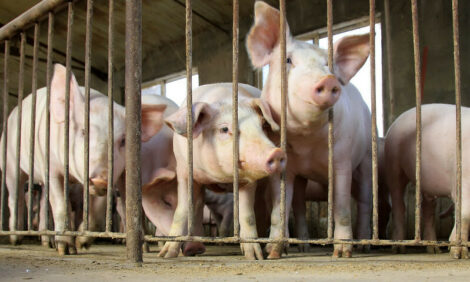



Healthy Piglets? Not with Sulphonamides
AUSTRIA - Young pigs are known to be particularly susceptible to intestinal problems, which not only discomfort the animals but also slow their growth – and thus increase the cost of meat production.The most common cause of intestinal problems in suckling pigs is the parasite Isospora suis, which according to the literature can be treated by a class of drugs known as sulphonamides.
Anja Joachim and colleagues at the University of Veterinary Medicine, Vienna (Vetmeduni Vienna) have investigated whether sulphonamides really do protect piglets against infection by Isospora.
The work confirms that sulphonamides can be used to control Isospora in piglets, although not without considerable effort and expense. In contrast, the drug toltrazuril is easy to use and provides efficient protection, although even piglets treated with toltrazuril become ill for other reasons unless they are kept under hygienic conditions.
Joachim's results have just been published in the journal Parasitology Research.
One of the most common types of neonatal illness in piglets is coccidiosis, a parasitic disease of the intestinal tract caused by the unicellular organism Isospora suis.
There are many reasons for attempting to control the disease, ranging from animal welfare considerations to pure financial concerns.
Unfortunately, however, the literature contains no clear guidelines on how this should be done. sulphonamides are frequently suggested as suitable preventative agents and so Joachim investigated the level of protection they afforded to suckling pigs under standardized conditions of infection.
Together with Hans-Christian Mundt of Bayer Animal Health GmbH, Leverkusen, Germany, she was able to show that sulphonamides can indeed be used to control piglet coccidiosis.
However, the use of these agents is associated with a considerable amount of work and therefore – and because of the short half-life of sulphonamides in pigs and the difficulty of predicting the appropriate time for treatment – they do not seem really suitable for use under conditions on farms.
So what hope is there for farmers – and for pigs? Fortunately there is another drug available to treat coccidiosis: toltrazuril.
Joachim and Mundt showed that a single application of this drug was able to control the disease under their standard conditions of infection.
And their work has been extended by Tanja Kreiner and colleagues in Joachim’s group at the Vetmeduni Vienna, who investigated the use of toltrazuril on pig farms in Austria.
The findings confirmed that pigs treated with toltrazuril are significantly healthier and suffer significantly less from diarrhoea than pigs that are not treated.
Interestingly, pigs kept under poor conditions of hygiene have an increased risk of becoming unhealthy or developing diarrhoea, even when given toltrazuril.
It is thus clear that applying the drug is not sufficient to prevent pigs from developing diseases caused by other agents: good hygiene also has an important part to play.
Despite this caveat, Joachim is optimistic.
“Our findings show that sulphonamides are not really suitable for use on farms but toltrazuril appears to work very well for the control of coccidiosis. The cost of treating animals is considerably lower than the financial losses due to the disease, so we would recommend all farms where coccidiosis is diagnosed to treat their pigs with this drug.“
Further Reading
| - | Find out more information on Coccidiosis by clicking here. |






